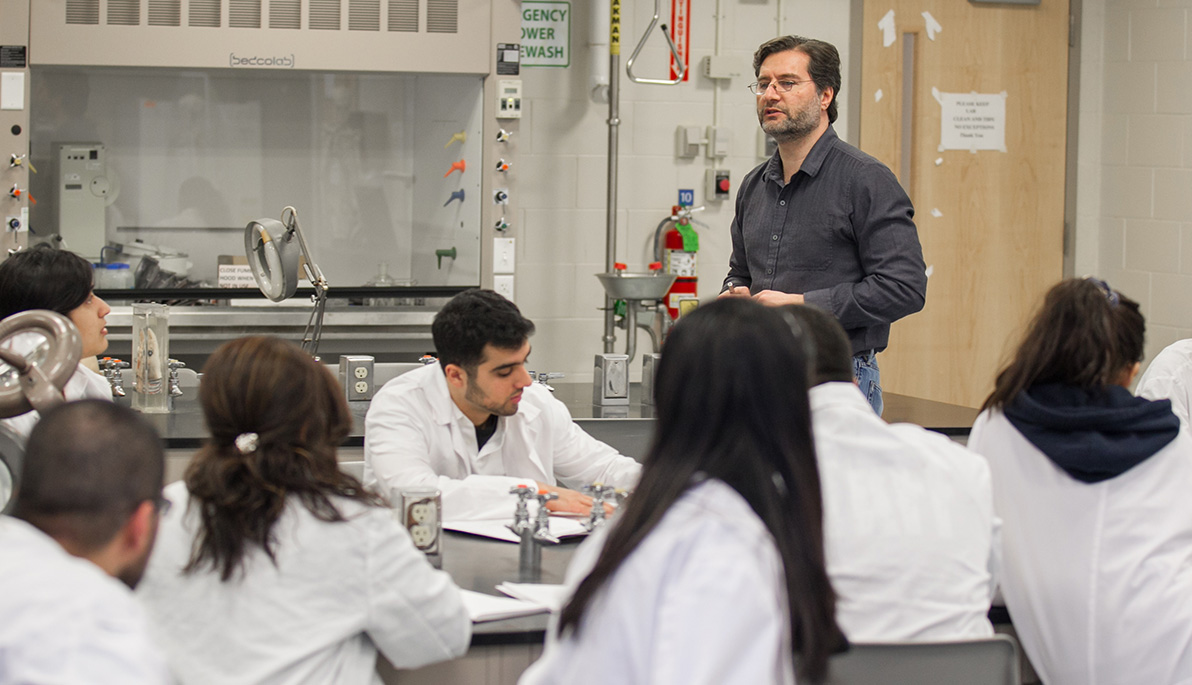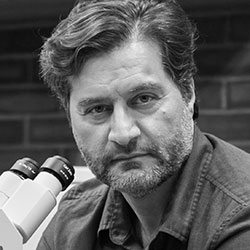
Faculty Profile: Michael Hadjiargyrou

Title: Department Chair; Professor and Director, D.O/Ph.D. Program
Department: Biological and Chemical Sciences, Biomedical Sciences
Joined New York Tech: 2012
Campus: Long Island
Life Sciences for Life
Department Chair, Ph.D. Program Director, and distinguished scientist Michael Hadjiargyrou, Ph.D., became seriously interested in biology after taking an undergraduate class in the field. “It sparked my interest,” he said. Hadjiargyrou has been studying biology ever since.
It’s not surprising, then, that he is also passionate about teaching biology. Hadjiargyrou sat down with The Box to describe his background, his research, and how his students inspire him.
Where did you grow up and go to college?
I was born in Cyprus and arrived in the United States as a teenager. We settled in Queens, and I attended the City University of New York for my undergraduate and graduate degrees.
What is something about you that your students might be surprised to learn?
I had a double major in college. Besides biology, my second major was philosophy.
What are some misconceptions people have about biology?
There are so many! One is that humans evolved from chimps. This is not true—humans, chimps, and bonobos shared a common ancestor. As such, we did not evolve from chimps.
Another one you hear a lot is that we only use 10 percent of our brain. For those who believe this, think again! Why would the brain evolve so that only 10 percent would be used? Of course, this is not true. We use all of our brain!
What do you predict for the field of biology now that coronavirus is on everyone’s mind?
We will learn lots more about every aspect of the coronavirus itself (its mutation rate, infectivity, our immune response, etc.). More importantly, we must learn to grasp its negative effects on multiple organs and systems so that we will be able to treat the millions of COVID “long haulers” who continue to suffer.
Why did you join New York Tech?
I wanted to come to New York Tech so that we could revitalize the department, both for educating our students and for carrying out quality research. As a department, we all worked together to build new degree programs. We revitalized curricula and created new research laboratories.
Of course, achieving these goals would not have been possible without the support of our administrators. Eventually, we established a connection to our College of Osteopathic Medicine, and together we launched the D.O./Ph.D. program.
What are your responsibilities as chair of the Department of Biological and Chemical Sciences?
In my administrative role, I oversee all aspects of the department. I am responsible for leadership, budgeting, and faculty recruitment, mentoring, and retention to class scheduling, student support, advisement, graduation approval, curriculum development, assessment, research activities, etc. Last of all, I represent our department at various university-wide events.
Obviously, I work closely with our faculty and staff in order to provide an outstanding education and service to our students.
What do you love about working in the lab with students?
I love seeing them get excited about doing experiments and generating data, learning new techniques, and being awed by the power of research. It inspires me to observe the way they change. I can see them mentally evolve over the years that they are part of our department.
Tell us about your research. What are you and your team working on?
My research is “basic,” which means it is done to understand how cells and tissues function. We seek to truly understand how proteins function within and outside of the cell. Specifically, we study the molecular and cellular mechanisms of musculoskeletal development and regeneration.
In many of our experiments, we are trying to understand how a broken bone heals. We hope that this information can one day be applied toward a therapeutic approach to accelerate fracture repair.
What is your proudest career moment?
Becoming a university professor!









